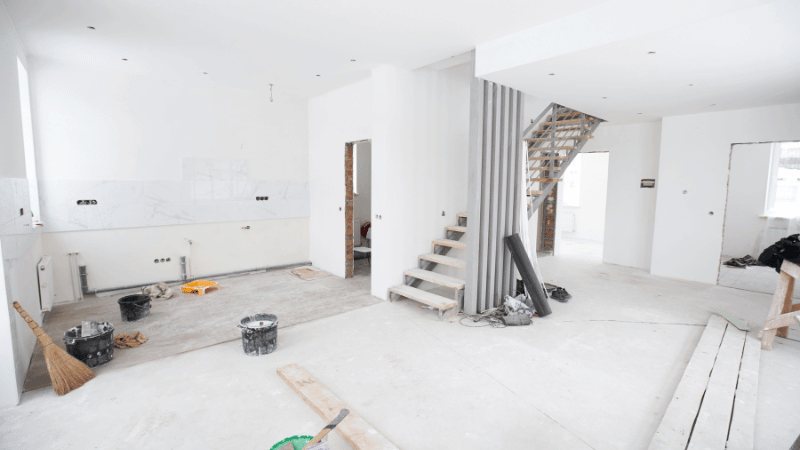Categories
Joint Mortgage Paid by One Person | What You Should Know

When you take out a joint mortgage, it is treated as if you and your partner are one entity, equally responsible for repaying the mortgage and with equal ownership of the home.
A core product for couples, joint mortgages have many advantages in the way they are assessed, bringing the power of two incomes together to make homes affordable.
What happens when a joint mortgage is paid by one person? Do they own a bigger share of the home? Are they more at risk? Do they have a greater legal standing? At Clifton Private Finance we help our clients navigate the complexities of joint mortgages - here’s what you need to know.
The Basic Legal Position of Joint Ownership
A joint mortgage means both borrowers are jointly and severally liable for the mortgage debt. From the lender’s perspective, they don’t care who is making the payments, only that the payments are being made.
By default, the ownership of the property in a joint mortgage is a 50/50 split - meaning each person owns half of the house. This is the case no matter who has paid what, so if one person has been shouldering the majority of the mortgage payments, it doesn’t change how much of the property they own.

Why Joint Mortgages Are Paid by One Person
If the mortgage is joint, why should it be paid by only one of the borrowers? There are actually many reasons, which range from adjusting to circumstances through to using joint mortgages to gain an advantage.
- One person earns more than the other - This is a fairly standard and reasonable reason for a joint mortgage to lean more in one direction. If one person earns more than the other, or is the sole earner in a family situation where the other parent stays at home (to look after children, for example), then it is normal that the payments are unbalanced.
- Temporary life change - A joint mortgage being paid by one person is rarely for the entire mortgage term. Temporary situations such as being in between jobs, illness, or building up a new career after a change can all result in the mortgage being covered by one person for a while.
- Relationship breakdown - If one partner moves out of the home, they might decide to stop paying their portion of the mortgage while the other partner stays. This would still leave both parties legally responsible for the debt, but unofficial arrangements in this way are common.
- One person simply stops paying - Disputes can result in one person choosing to no longer make payments. Though this may be difficult for the other partner to deal with, legally they must simply make up the deficit or risk their home.
Recent Mortgage Case Studies
Read some of our recent client stories detailing how we can help in complex and unorthodox mortgage scenarios:
Mortgage Contributions vs. Joint Equity
For many people, the core default truth regarding shared ownership feels unfair or comes as a shock - especially if the relationship has come to an end. ‘Surely,’ they say, ‘the fact that I’ve paid all the mortgage means the house is mine?’
The ’no’ response can be hard to swallow. Let’s look at why that is:
- The agreement is an equal joint ownership - A joint mortgage is exactly that: joint. It means ‘shared’ and without any additional agreement in place to make that share anything other than equal, it means that the ownership is equal. Throughout the mortgage, the responsibility to make the payments has also been equal, regardless of what has actually happened. If at any time, one of the partners had stopped paying, the other would have always been legally responsible for the debt.
- Paying the mortgage is not the only contribution - In a family situation, just because one person has put in the money for the mortgage and the home, doesn’t mean they’re the only person contributing. In cases of divorce or separation, courts understand that taking care of the financial responsibilities is only part of the family structure. The other partner, paying less or nothing to the mortgage, has still given their time to the family, looking after the home and those who live there. This non-tangible contribution is as valuable as the finances and is considered to hold equal weight.
- Stability for children is important - If children are involved, courts will always consider the stability of their home above such things as arguments over home equity.
- You knew this going in - A joint mortgage will have been explained in full before you agreed to it. It is, therefore, clear that it was considered fair by both of you at the time of signing the mortgage agreement - otherwise, why did you do it?

What Happens if One Person Stops Paying?
What’s the realistic outcome if one person stops paying a joint mortgage and just how much pressure is put on the other partner? Here's what you need to know:
- The lender doesn’t care - It’s important to understand that from a lender’s perspective, the joint nature of the mortgage means both partners are both jointly and severally responsible and it is this second word, ‘severally’, that comes into play. It means ‘separately or individually’, indicating that even alone, one of the partners must make the payments.
- The credit impact affects you both - If payments are missed, the impact on your credit history and rating will be equal for both of you. If debt recovery moves to CCJs (County Court Judgements), then both of you will have that mark on your record.
- Repossession is the lender’s last resort - If the situation doesn’t improve and repayments are not made, the lender will repossess the home and sell it to recoup their losses.
This means that in many circumstances, the pressure on one of the borrowers is such that they do everything they can to make the payments and keep their home.

3 Options to Protect Yourself in a Joint Mortgage
It is always better to consider what could happen if things go wrong in the future, especially when making a significant financial commitment such as a mortgage. Options do exist to limit the potential damage of a joint mortgage:

Consider a Tenants in Common mortgage - A joint mortgage is designed to treat the couple as a single entity, with equal shares in the home and equal responsibility for the mortgage. It has long been used by married couples and those building a family, however, it is not the only option. A Tenants in Common mortgage is a similar agreement only it is structured with a clearer formal division of shares. With a Tenants in Common mortgage, it is possible to detail shares in unequal portions, such as 70/30, with the level of mortgage responsibility and home ownership appropriately assigned.

Use a Deed of Trust - A Deed of Trust is a legal agreement that sets out ownership shares and financial obligations to avoid any future legal complications. They are part of a standard Tenants in Common mortgage agreement but can also be put in place midway through a joint mortgage to recognise the changes that may have come about and offer legal protection.

Put a pre-nuptial agreement (prenup) in place - UK courts do not consider prenups legally binding (as they are in the US), but they will be considered and it has become increasingly common that they are adhered to. While they do not represent a secure guarantee should a relationship end, they do play a valuable part in influencing a court’s decision.

Why Have a Joint Mortgage?
With so many potential problems with a joint mortgage being paid for by one person, why would anyone choose a joint mortgage in the first place? There are many advantages to a traditional joint mortgage, including:
- Larger mortgage - Two salaries provides greater borrowing power, making obtaining a dream home more achievable, even if in reality one person pays the majority of the mortgage.
- Easier mortgage approval - Joint mortgages are an established product with a swift application process.
- The security and respect of equal ownership - If one partner knows they are making a smaller financial contribution, a joint mortgage provides them the respect to know their contribution to the family is considered equally valuable.
- Normality - Many couples see a joint mortgage as a natural part of their commitment to each other and the family.
- Estate planning - Joint tenants automatically inherit the property should the other person die, making the security of the family home worry-free during a time of grieving and stress.
- Investments - Joint mortgages can offer investment opportunities when friends or business partners are looking to share ownership.
While a Tenants in Common mortgage can offer some of these benefits too, only a joint mortgage represents the clear sharing of ownership and smooth inheritance transfer that’s an intrinsic part of feeling secure in your family home.
What to Do if One Person Wants Out of the Joint Mortgage
A joint mortgage is a significant commitment, but it’s not a financial jail sentence - there are good ways to deal with the situation if one person wants to release themselves from a joint mortgage:

Remortgage to a Tenants in Common mortgage - If the problem is one of a desire for non-equal shares, it is possible to change the mortgage from a joint mortgage with equal shares to a Tenants in Common mortgage with a disproportionate split. Speak with our mortgage advisory team to find out more about remortgaging in this way.
Note that if only one of you wants to make a change in this way, you can apply a Severance of Joint Tenancy, which does not require both parties to agree.

Selling the home and splitting the money - The simplest ‘complete out’ is to accept your time together in the property is over, sell it, pay the remaining mortgage balance and share the remaining income equally.

One person buys the other out - In many cases, the mortgage can be refinanced and put into a single name, clearing the other person from the debt and buying their equity in the home. With the help of an experience mortgage broker such as Clifton Private Finance, this can be smoothly navigated.

Keeping a friendly agreement with one person still living in the home - While this is risky, if there is no animosity and you both act in a mature fashion, a relaxed agreement between you is easy to put in place. Legally, however, nothing has changed and you would both remain joint owners with equal responsibility to make mortgage payments.

Force a sale - If your partner is refusing to sell and being uncooperative, there are legal routes that can force the sale of the house so that you can end the joint mortgage and walk away.
If you are having a dispute or your relationship is ending, it is advisable to seek legal advice and formalise any arrangement as soon as possible to prevent future problems.
Dealing with Joint Mortgages with Clifton Private Finance
At Clifton Private Finance, our expert mortgage team has all the experience you need to get the most out of your joint mortgage and protect yourself from any ill-feeling or disputes later in life.
Don’t let your joint mortgage weigh heavily on you - speak to one of our specialists today to discuss your concerns and put into place a plan for the future.












